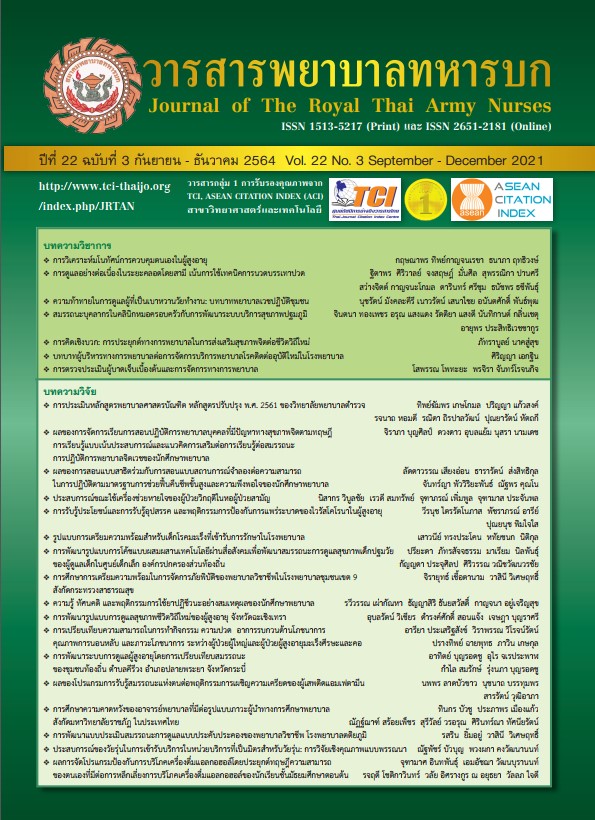Diabetes Management in Working Age Group: The Challenging for Nurse Practitioners
Keywords:
Diabetes Mellitus, Diabetes self-management, Nurse practitionersAbstract
Diabetes mellitus (DM) is a chronic and complex disease that impacts on the lives and well-being of individual life, family, community, social and countries, particular increasing number of diabetes people in working age group. The challenging for people with diabetes that they need long-term care through multiple tasks that requires change in their lifestyle. This is quite difficult for adult population with diabetes, who are responsible their role and responsibility both of themselves and their family, they also need to learn skills and tasks to manage the disease for preventing or delaying complications by controlling blood glucose. This article focused on the challenge for nurse practitioners on diabetes self-management education and support (DSMES) to enhance and maintain self-care behaviors in working age group, based on the American Association of Diabetes Educations (AADE), AADE7 self-care behaviors and expanded chronic care model (ECCM).
Downloads
References
Karuranga S, Malanda B, Saeedi P, Salpea P [Editorial]. IDF diabetes atlas. 9th ed. International Diabetes Federation; 2019: 34-155.
Aekplakorn W [Editor]. Thai National Health Examination Survey V (NHES V). Health System Research Institute. Nonthaburi 2015. (In Thai)
Armstrong DG, Swerdlow MA, Armstrong AA, Conte MS, Padula WV, Bus SA. Five years mortality and direct costs of care for people with diabetic foot complications are comparable to cancer. Journal of foot and ankle research 2020; 13(1): 16.
Chatterjee S, Riewpaiboon A, Piyauthakit P, Riewpaiboon W, Boupaijit K, Panpuwong N, Archavanuntagul V. Cost of diabetes and its complications in Thailand: a complete picture of economic burden. Health & social care in the community 2011; 19(3): 289–98.
American Diabetes Association. Standards of medical care in diabetes-2020. The Journal of Clinical and Applied Research and Education 2020; 43(1): S54.
Panyathorn K, Tajang,S, Sriboonpimsuay W, & Trongsri C. Life-style of diabetes patients: a comparative study of good controlled and uncontrolled group in Chiangyuen health promoting hospital, Udonthani province. Udonthani Hospital Medical Journal 2020; 28(1): 20-29. (In Thai)
Chantha W. Health literacy of self-care behaviors for blood glucose level control in patients with type 2 diabetes, Chainat province [Thesis]. Pathumthanee: Thammasat University; 2016. (In Thai)
Thongpootorn P, Lowirakorn S. Food consumption of diabetic patients with uncontrolled plasma glucose level at diabetic clinic, Kut Chap hospital, Udon Thani province. KKU Journal for Public Health Research 2020; 13(1): 22-32. (In Thai)
American Association of Diabetes Educators (AADE). An effective model of diabetes care and education, revising the AADE7 self-care behaviors. The Diabetes EDUCATOR 2020; 46(2): 139-160.
Barr VJ, Robinson S, Marin-Link B, Underhill L, Dotts A, Ravensdale D, et al. The expanded chronic care model: an integration of concepts and strategies from population health promotion and the chronic care model. Hospital Quarterly 2003; 7(1): 73-82.
Thailand Nursing and Midwifery Council. The Announcement of Nursing Council on the scope and competence of advanced nursing practitioners in various field. Government Gazette 2021; 126: special part 16 ng. (In Thai)
Cheevakasemsook A. Health assessment to quality nursing diagnosis: principles, issues and resolutions. Journal of the Royal Thai Army Nurses 2021; 22(1): 38-46. (In Thai)
Schreiner B. The diabetes self-management education process. In: Cornell S, Halstenson C, Miller D, Editors. The art and science of diabetes self-management education desk reference. 4th ed. Chicago: American Association of Diabetes Educators; 2017.
Song D, Xu TZ, Sun QH. Effects of motivational interviewing on self-management in patients with type 2 diabetes mellitus: a meta-analysis. Internal Journal of Nursing Science 2014; 1(2014): 291-97.
Siopis G, Colagiuri S, Margaret A-F. Effectiveness of dietetic intervention for people with type 2 diabetes: a meta-analysis. Clinical Nutrition 2020; 40(5): 3114-22.
Kim J, Hur M-H. The effects of dietary education intervention on individuals with type 2 diabetes: a systematic review and meta-analysis. International Journal of Environmental Research and Public Health 2021;18: 8439.
Kumar AS, Maiya AG, Shastry BA, Vaishali K, Ravishankar N, Hazari A, et al. Exercise and insulin resistance in type 2 diabetes mellitus: a systematic review and meta-analysis. Annals of Physical and Rehabilitation Medicine 2019; 62: 98-103.
Riangkam C, Sriyuktasut A, Pongthavornkamol K, Kusakunniran W, Sriwijitkamol A. Effects of a mobile health diabetes self-management program on HbA1C, self-management and patient satisfaction in adults with uncontrolled type 2 diabetes: a randomized controlled trial. Journal of Health Research 2021.
Wang Y, Min J, Khuri J, Xue H, Xie B, Kaminsky LA, et al. Effectiveness of mobile health interventions on diabetes and obesity treatment and management: systematic review of systematic reviews. JMIR Mhealth Uhealth 2020; 8(4): e15400.
Downloads
Published
How to Cite
Issue
Section
License
บทความหรือข้อคิดเห็นใดใดที่ปรากฏในวารสารพยาบาลทหารบกเป็นวรรณกรรมของผู้เขียน ซึ่งบรรณาธิการหรือสมาคมพยาบาลทหารบก ไม่จำเป็นต้องเห็นด้วย
บทความที่ได้รับการตีพิมพ์เป็นลิขสิทธิ์ของวารสารพยาบาลทหารบก
The ideas and opinions expressed in the Journal of The Royal Thai Army Nurses are those of the authors and not necessarily those
of the editor or Royal Thai Army Nurses Association.






